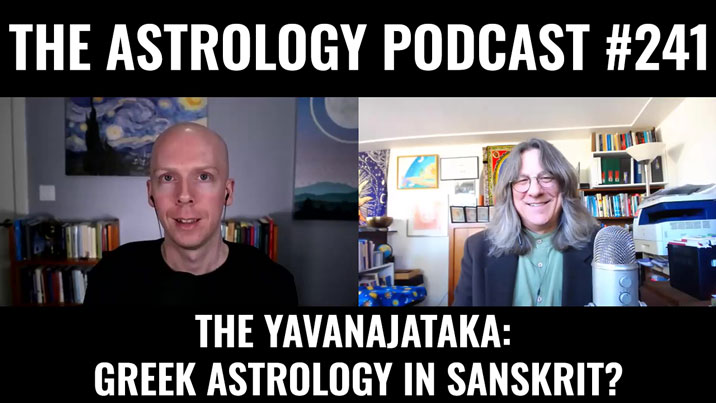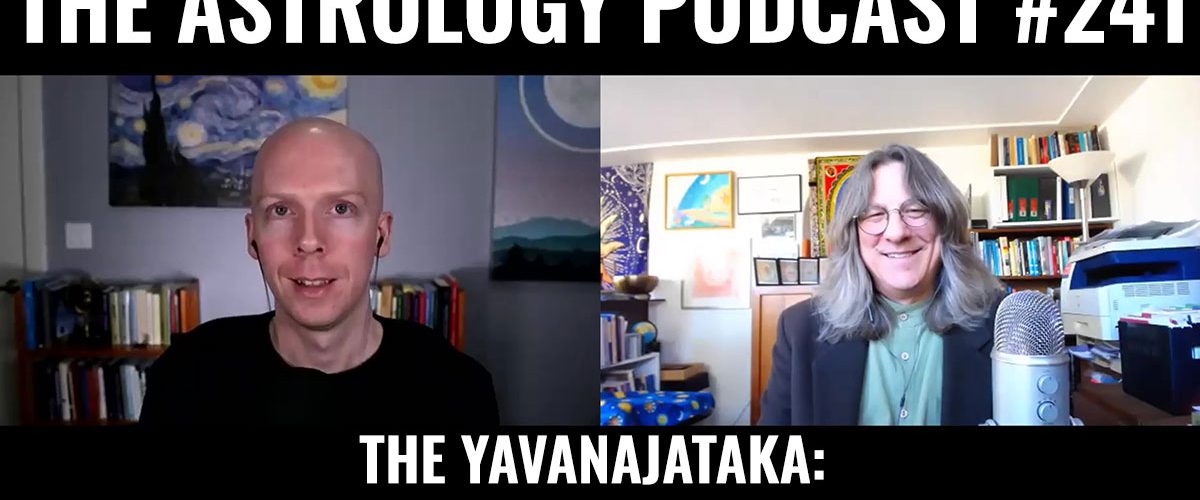
Episode 241 of the podcast features an interview with Kenneth Miller about an ancient Sanskrit text from India known as the Yavanajataka, and the debate about whether it is a translation of a Greek work on Hellenistic astrology.
A critical edition and commentary on this text was published by David Pingree in 1978, and since that time it has become generally accepted in academic circles that there was some sort of transmission of Greek astrology to India between the 1st and 7th centuries CE, which was then merged with the indigenous forms of astrology that already existed there.
In recent years some scholars such as Bill M. Mak have pushed back on Pingree’s dating of the Yavanajataka and some of the conclusions that he drew from the text, while still accepting the general premise that the text demonstrates that some sort of transmission did occur.
These conclusions on the part of academics are sometimes rejected by some practitioners of Indian astrology, who believe that their tradition dates back thousands of years, and was integrated into the ancient Vedic religion.
At the United Astrology Conference in 2018 Kenneth Miller presented a talk titled There’s Curry in my Feta! The Development of Horoscopic Astrology in India and Egypt, where he pushed back on the notion that the Yavanajataka presents a purely Greek form of astrology.
In this podcast episode we decided to sit down and talk about both sides of the debate, and then actually read through several passages from Pingree’s translation of the Yavanajataka, in order to highlight both some similarities as well as some differences when compared to the doctrines of Hellenistic astrology.
Kenneth practices Indian astrology, and is also the President of Kepler College, and you can find out more information about his work at:
This episode is available in both audio and video versions below.
Watch the Video Version of This Episode on the Yavanajataka
Here is the video version of our discussion about the Yavanajataka:
–
Transcript
A full transcript of this episode is available: Episode 241 transcript
Listen to the Audio Version of This Episode
You can either play the audio version of this episode of the podcast directly from the website or download it as an MP3 to your device by using the buttons below:
Podcast: Play in new window | Download (Duration: 2:29:55 — 103.0MB)


When you go into these types of debates, you really need a Vedic Scholar on the show… to help you with the scope of this topic within a comment thread is pretty difficult. The Veda’s are not a religous text, it is a library of peer-evaluated truths written across 18,000 books which are inscribed on metal tablets written in Sanskrit which definetly still exist, you just need to go there. Sanskrit takes approximately 8 years to learn, it is considered the perfected language because of its 4000 gramatical rules (start, middle and end must match or its not valid) its written vibrstion and its sound vibration matches, it is the root of Greek and Latin. The Ramaayan occurred 1.7 million years ago, you need to study the Maha Yuga Cycles (1 Yuga cycle = 4.32 Million years – start researching that at the very least). There is no religion called Hinduism, only Lineages – which there are many. The ‘ism’ term is a colonial given term because thats a British pre-conceived understanding… I can’t stress enough, this topic is very big and takes years to actually map out. A good person to start a conversation with would be Jeffrey Armstrong, he’ll point where to start researching. Cheers!
“Some practitioners”? By that I guess you mean all or nearly all of them. The cultural appropriation of Hellenistic astrology (and some earlier transmissions from Mesopotamia and their zone of influence) has always been the standard practice in what is now India and Pakistan and parts of Afghanistan, from the get go, unlike the Greeks that took great pride in attributing many of their own inventions and developments to earlier, often enough, foreign cultures, this intellectual openness being the very reason why to this day that Hellenistic cultural hub is still source to so much progress in the West and beyond, in what it is today India the habit was the opposite. To retrograde into their own culture the labor fruits of others with little recognition for the source. Not only do Hindu nationalist live in this fantasy history of theirs, outrageously unscientific and unethical as it may be, but many of their apologists in the West fall for the exact same nonsensical fantasm, seeing direct relationships with the Indus Valley, ascribing much older and much more sophisticated origins and meaning to the very incoherent and extreamly eclectic Vedas, and allowing this fantasy construct to swallow up the astronomical and astrological lore of other cultures and spit them out in shiny and fragrant ‘vedic’ colors. While syncretism is fine and learning from others a virtue, to do what the ‘sages of old’ did and what today’s ‘practitioners’ do is ugly and undignified.